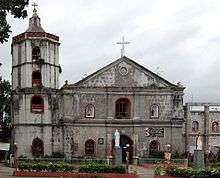San Agustin Parish Church (Bay, Laguna)
St. Augustine Parish Church (Filipino: Simbahan at Parokya ni San Agustin) is the only Augustinian Roman Catholic church in Bay, Laguna, in the Philippines. The church was first administered by Augustinians friars and later transferred to the Franciscans.
| Bay Church | |
|---|---|
| St. Augustine Parish Church | |
 Facade of St. Augustine Parish Church | |
.svg.png) Bay Church Republic of the Philippines | |
| 14.180369°N 121.284315°E | |
| Location | Bay, Laguna |
| Country | Philippines |
| Denomination | Roman Catholic |
| History | |
| Former name(s) | Iglesia y Convento de Bay |
| Status | Parish church |
| Founded | 1571 |
| Founder(s) | Fray Martin de Rada OSA |
| Dedication | St. Augustine of Hippo |
| Consecrated | 1580 (as Parish) |
| Architecture | |
| Functional status | Active |
| Heritage designation | Iglesia y Convento de Bay |
| Designated | 1572 |
| Architectural type | Church building |
| Style | Colonial Baroque |
| Groundbreaking | 1572 |
| Completed | 1737 |
| Specifications | |
| Materials | Bricks, gravel, limestone |
| Administration | |
| Archdiocese | Manila |
| Diocese | San Pablo |
| Province | Manila |
| Clergy | |
| Archbishop | Luis Antonio Tagle |
| Bishop(s) | Buenaventura M. Famadico |
| Priest(s) | Licerio S. Taguilaso |
| Assistant priest(s) | Mark Anthony M. Jamero |
History
It is historically considered as the oldest Roman Catholic church in the Province of Laguna upon the early conquest and establishment of La Laguna.
The first church of Bay was constructed made of light material of bamboo and nipa by the first ever catholic missionaries in Laguna, the Augustinian friars of Provincia del Santisimo Nombre de Jesus. Augustinians.[1] It was built along the shore of Laguna Lake (now Brgy. San Agustin) the town church itself was under supervision of Prior provincial otself no other than Fray Martin de Rada (de Herada in some documents) under the patronage of the order's major patron St. Augustine in 1571.[2] It became a parish on April 30, 1578.[2] In 18th century, the ecclesiastical administration of Bay was transferred to the Orden of Franciscan Minors (OFM), with Father Domingo Martorel as its new parish priest on November 23, 1737.[1] From the original site along the lake, the church was transferred to its present site later known as poblacion, or town center. In 1804 a structure made of bricks and wood was built under the supervision of Fray Geronimo Hervas OFM. construction of the church continued until the tenire of Fray Pedro Moya in 1864.[2][3]
When the most devastating earthquakes in the Philippines struck in 1880, the Luzon earthquake, the church suffered some damage such as the church roofings. The earthquake also brought number fatalities within the townspeople.[4]
When the regular clergy(missionaries) abandoned the Philippines in 1898-1899 due to the Philippine Revolution against Spain and in 1899-1903 at Philippine–American War, the Bay church and convent was administered by the Secular Clergy by the Archidiocese of Manila. Another turmoil came into the town that the church were heavily damaged during the Japanese occupation of the Philippines and the break-out of the Second World War from 1942 to 1945.[2] When the peace time came in 1953 the church was gradually rebuilt by Father Alejandro Vermorel.[2] When the Archdiocese of Lipa was created, the church was transferred to the newly created Archdiocese of Lipa as of April 16, 1967.[2] In 1980s the Canonical administration of Bay Church were transferred again to the newly created Diocese of San Pablo
Notes
- Huerta 1865, p. 168
- National Historical Institute 1993, p. 42
- Huerta 1865, p. 169
- "American Journal of Science - Art.V. The earthquake of the Philippine Islands, July 1880", pp.52–57.
Bibliography
- Huerta, Felix de (1865). Estado geográfico, topográfico, estadístico, histórico-religioso. Binondo: Imprenta de M. Sanchez y Ca.CS1 maint: ref=harv (link)
- Historical Markers: Regions I–IV and CAR. Manila: National Historical Institute (Philippines). 1993. p. 42. ISBN 9715380611.
External links
![]()